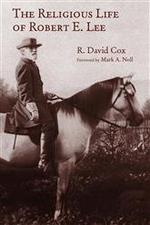 The Religious Life of Robert E. Lee
The Religious Life of Robert E. Lee
by R. David Cox
Series: Library of Religious BiographyPDF (will be published as paperback), 259 pg.
Wm. B. Eerdmans Publishing Company, 2017
Read: December 25, 2016 – January 1, 2017

I feel always as safe in the wilderness as in a crowded city. I know in whose powerful hands I am, & in them rely, & I feel that in all our life we are upheld & sustained by Divine Providence. But that Providence requires us to use the means he has put under our control. He deigns no blessing to idle & inactive wishes, & the only miracle he now exhibits to us, is the power he gives to truth & justice, to work their way in this wicked world.
So wrote Robert E. Lee in a letter to his wife while serving in Texas, and according to R. David Cox it summarizes his theology. If you have to sum up a man’s theology in 3 sentences, that’s a decent one to have.
Robert E. Lee was no theologian, he wasn’t a pastor or preacher or religious scholar of any kind. He was a churchman, however. Seemingly a faithful one who served as he could — and he was a believer in the middle of a tumultuous time for American Protestantism and American as a whole, as such what he thought about the tumult from his religious perspective is instructive and fascinating reading. Which is pretty much why anyone might want to read this (and probably why Cox wrote the thing).
By and large, the book is a chronological look at Lee’s life, what’s going on in the national and ecclesiastical culture, and how Lee (and his family members — particularly his wife) responded to it and how his faith grew throughout his life. It’s not exactly a biography, but it is biographical. There were a couple of chapters that stepped back from the chronological look, and examined Lee’s perspectives on specific topics (the above quotation about providence comes from one of those). I particularly enjoyed and appreciated those.
I was surprised how little space was devoted to the years of The War Between the States, honestly. It may be that there wasn’t that much material — Lee was probably too busy to write a lot of things in letters that he might normally have (like: thoughts about sermons heard, theology, ecclesiastical concerns, etc.), that’d certain be understandable. Cox might be the one historian who doesn’t like writing about that time period. It might just be that his pre- and post- War writings were better material for the book — there are any number of good reasons for it, I was just surprised that the one thing the man is best known for is so little represented in the book.
One of the drawbacks of this book is the author’s perspective on Lee himself (at least what came across to me as his perspective, I could have read him wrong, he could have written it in such a way as to be easily misinterpreted, etc.). I’m not saying that I want a hagiography, nor do I want Cox to be some sort of Lee fanboy. A critical eye is essential. There’s an element of Chronological Snobbery (to borrow Lewis’ phrase) here when reflecting on Lee’s racial and political views. I have no problem with Cox disagreeing with them (I disagree with many of them), but he came across as patronizing (at least on the border of it). To a lesser degree, I thought the same about some of Lee’s religious views. But this didn’t crop up often, and when it did, it was easy to gloss over or ignore. It’s a drawback to the book, but not a reason to avoid it. If anything, Cox came across as detached and neutral when it came to the subject and his religion (it was impossible to tell if Cox shared any aspect of belief with Lee) 98% of the time. It’s just that 2% or so . . .
This is a part of Eerdman’s Library of Religious Biography series — which I hadn’t heard of until now. I have one sitting at the top of my To Be Bought pile (talked about it last month in a Saturday Miscellany post), but I didn’t realize it was part of a series. The books in the series are intended to “link the lives of their subjects – not always thought of as ‘religious’ persons – to the broader cultural contexts and religious issues that surrounded them.” It’s a fascinating concept, and I’m glad this series exists. I hope to get more of them soon.
This was a fascinating read, if a bit dry and detached. Neither’s bad, and may be commendable under the right circumstances (which may include such a divisive figure as Lee), but it doesn’t make for the best read. That, plus my ambivalence towards some of Cox’s attitudes toward the subject, makes me rate this 3 Stars. That’s still a recommendation, and I’ll gladly tell anyone to read it — believer or nonbeliever — if they want to understand Lee better, but I’m not that enthusiastic about the book.
Disclaimer: I received this eARC from Wm. B. Eerdmans Publishing Company via NetGalley in exchange for this post — thanks to both for this opportunity.
N.B.: As this was an ARC, any quotations above may be changed in the published work — I will endeavor to verify them as soon as possible.
—–


